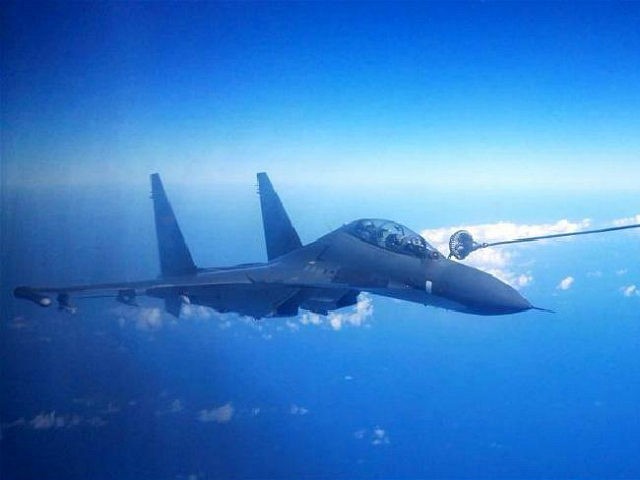On Thursday, U.S. officials announced that two Chinese fighter jets conducted an “unprofessional” intercept of a U.S. Navy plane in international airspace over the East China Sea.
The incident occurred during a routine flight Wednesday by an American WC-135 “Constant Phoenix” aircraft. The WC-135 is often used as a “sniffer” to detect the aftermath of nuclear detonations, such as the one North Korea is feared to be preparing for.
U.S. officials told CBS News the WC-135 was approached by two Chinese Su-30 fighters, which “flew within 50-70 feet of the WC-135’s right wing tip, then one of the Su-30s did a barrel roll over the top of the American plane.”
The crew of the WC-135 described the Chinese intercept as “unprofessional” due to the speeds involved and the close proximity of the aircraft but came short of using the word “unsafe,” which is a term of great significance in such incidents.
Pacific Air Forces spokeswoman Lt. Col. Lori Hodge told CBS News the matter would be addressed through “appropriate diplomatic and military channels,” stating that such a subdued approach would help the United States “continue building confidence with our Chinese counterparts on expected maneuvering to avoid mishaps.”
The Chinese Foreign Ministry, on the other hand, insinuated that the U.S. plane was using radiation-sniffing as a pretext to spy on China, which has declared an air-defense identification zone in the area which the U.S. and its allies do not officially recognize.
“For a long time U.S. ships and aircraft have been carrying out close-up surveillance of China, which can really easily cause misunderstandings or misjudgements, or cause unexpected incidents at sea or in the air,” the Foreign Ministry said, without explicitly accusing this particular WC-135 of conducting surveillance operations against China.
Professor of International Relations Shi Yinhong of Renmin University in Beijing suggested to the New York Times that China “suspects the reconnaissance plane not only wanted to know about North Korea, but wanted to know what’s going on in China with advanced military equipment.”
Shi also suggested China might be looking to flex its muscles and enforce its air defense identification zone, taking advantage of President Donald Trump’s perceived political weakness.
“This may be to show that Trump dare not harm the China relationship,” he said.

COMMENTS
Please let us know if you're having issues with commenting.